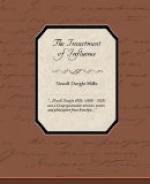“Then awhile Satan stood, expecting
their universal
shout
and high applause
To fill his ear, when contrary
he hears
On all sides from innumerable tongues
A dismal universal hiss, the
sound
Of public scorn. He wondered, but
not long
Had leisure. Wondering
at himself no more,
His visage drawn, he felt; too sharp and
spare
His arms clung to his ribs,
his legs entwining
Each the other, till supplanted down he
fell,
A monstrous serpent
on his belly prone,
Reluctant, but in vain. A
greater power
Now ruled him, punished
in the shape he sinned,
According to his doom.”
Also when Satan attempted to speak, Milton says, only a hiss went forth “from forked tongue to forked tongue.” When many days had passed by and their hunger was very sore because these fallen angels had seduced man by an apple, it came about that when, fierce with hunger, they seized the fruit ripe upon the branches, the apples were found to be filled with soot and ashes. By these striking suggestions Milton gives us his idea how angels and men reap what they sow. Should the literary critic seek an appropriate heading for the tenth book of “Paradise Lost,” he could hardly find one more appropriate than this: “What Man Soweth, That Shall He Also Reap.”
This law of the spiritual harvest that visits retribution upon unrighteousness or visits reward upon integrity seems to have cast a spell of fascination upon all great writers. Even those who have written upon liberty, law, patriotism, or love have not been content to end their task until they have, through song or story, illustrated this law of the soul’s seedtime and harvest. The ancient poet who wrote at a time near to the dawn of history makes a strong man go forth to seize his neighbor’s flocks and herds, but returning the prince found that in his absence enemies had looted his palace and carried off not only his treasure, but his wife and children. In ending the tale the writer adds the reflection that “God is just!”
Later on the Grecian threw this moral principle into a tale for children, a story that still lives under the title “Baucis and Philemon.” One day two travelers entered a village, but as they drew near, each housewife slammed her door, while rude boys threw clods at the wayfarers and let loose their dogs, who snapped and snarled after the travelers. Passing quite beyond the village the pilgrims came to a humble cottage. As they approached his




